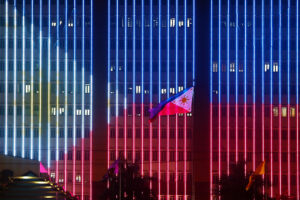By Beatriz Marie D. Cruz, Reporter
THE PHILIPPINES dropped four spots in the 2025 Global Startup Ecosystem Index amid persistent gaps in infrastructure and regulations, according to global research firm StartupBlink.
In this year’s index, the Philippines slipped to 64th place out of 100 countries with a score of 2.237.
This was the fourth straight year of decline for the Philippines, which ranked 52nd in 2021, 57th in 2022, 59th in 2023 and 60th in 2024.
“The ecosystem growth of the Philippines is around 0.56% this year, and it’s being overtaken even by locations that are also decreasing in the rankings,” StartupBlink Head of Data & Consulting Ghers Fisman said in a virtual briefing on Tuesday.
The Philippines’ annual ecosystem growth rate was the lowest in Southeast Asia.
To increase the Philippines’ score, Mr. Fisman said the process of establishing a startup at the business level should be easier. He also noted the importance of faster and wider internet access for Philippine entrepreneurs.
The Global Startup Ecosystem Index evaluates startup ecosystems across 100 countries and 1,000 cities, using scores that assess the quantity and quality of startups and their existing business environment.
“The Philippines is making progress toward becoming a formidable startup ecosystem in the Asia-Pacific region,” StartupBlink said in the report.
The Philippines received total funding of $273.6 million (around P15.22 billion) last year, according to the report.
“The Philippines’ startup ecosystem is anchored by robust sectors such as fintech (financial technology), e-commerce, healthtech, edtech, and software-as-a-service. This diversification is propelled by a large digital consumer base and increasing regional demand,” it said.
StartupBlink noted the Philippines’ attractiveness to foreign entrepreneurs and digital nomads “should allow for successful ecosystem growth — provided more of the local population embraces entrepreneurship.”
The Philippines has six cities in the global top 1,000, led by Manila.
Manila ranked 112th globally, dropping 11 spots from the previous year. It also dropped to 6th place in Southeast Asia rankings and was the only city to see a decline.
“The Philippines’ startup scene remains centralized in Manila, whose ecosystem is twelve times larger than Cebu City’s. This gap has more than doubled since 2020,” StartupBlink said.
However, Manila had the lowest ecosystem annual growth rate among cities in the Philippines at 2.6%.
Cebu City fell 10 spots globally to rank 469th, with an annual growth rate of 9%.
Davao City rose 163 spots to 580th spot globally, as its startup ecosystem grew by 97.7% last year.
Cagayan de Oro and Naga climbed the global rankings at 693rd and 767th, respectively.
New entrants to the global rankings include Iloilo City (744th), Cauayan City, Isabela (1,040th), and Solana City in Cagayan (1,170th).
“The Philippines stands as Southeast Asia’s fastest-growing digital economy, reflecting a dynamic consumer market ripe for innovative startups,” StartupBlink said.
However, the Philippines faces several challenges that are hampering its development as a mature startup ecosystem.
“The lack of infrastructure is a limiting factor to the country’s economic growth, and entrepreneurs struggle with slow regulatory support for their startups,” it added.
John Paolo R. Rivera, senior research fellow at the Philippine Institute for Development Studies, said the country’s continued decline in the global startup rankings reflect structural gaps in the ecosystem.
“Improving our rank will depend not on isolated programs but on building a dynamic innovation ecosystem with strong interlinkages across the government, academe, industry, and startup founders themselves,” he said in a Viber message.
Key gaps in the local startup scene include poor early-stage funding support, uneven regional startup development, regulatory bottlenecks, and a “brain drain” of digital and entrepreneurial talent, Mr. Rivera said.
To address this, the Philippine government must adequately fund and fully implement the Philippine Startup Development Program, reduce bureaucratic red tape, and harmonize startup registrations and incentives, he added.
Venture capitalists and the private sector should also expand early-stage funding, mentorship, and link Filipino startups to global markets. Academic institutions can support student-founded ventures through incubation, intellectual property protection, and seed grants, Mr. Rivera said.
